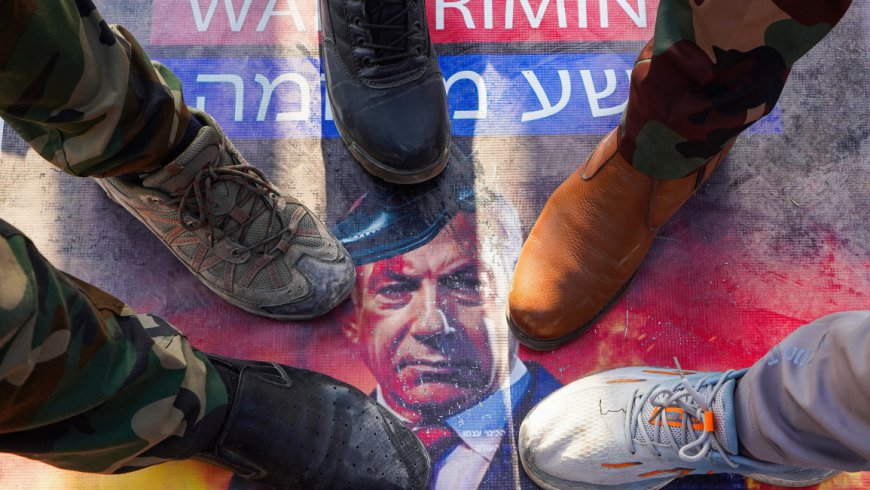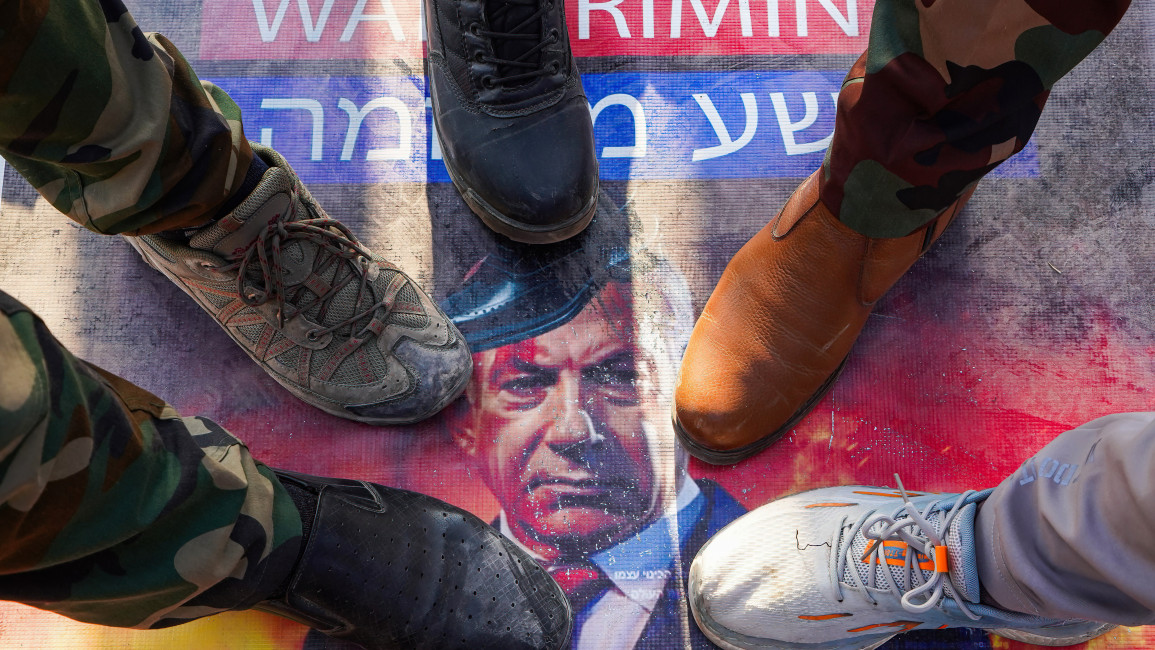Israel and the ICC: A Catch-22 for the West’s rules-based order
By Mouin Rabbani, By refusing to enforce ICC warrants, the West has hardened its support for Israel's genocide, relying on absurd justifications to do so, says Mouin Rabbani. Shortly after the Palestinian Authority (PA) submitted its first and ultimately unsuccessful application to join the International Criminal Court (ICC) in 2009, a discussion with a European diplomat turned to the subject of Israeli impunity. A successful Palestinian application, and eventual ICC investigation of Israeli conduct in the occupied territories would, according to my interlocutor, present European governments with a serious dilemma. Specifically, it would force them to choose between their commitment to Israel and their professed commitment to international law and its newest creation, the ICC. Left unstated, but more than implied, was that any such investigation would inevitably lead to indictments of Israeli leaders for a variety of crimes enumerated in the ICC’s Rome Statute. In other words, European governments would be forced to either comply with their international obligations or reject them. Fifteen years later, that most European of dilemmas – choosing between principles sanctimoniously pontificated around the globe with incessantly wagging fingers, and putting said principles into practice oneself – has suddenly become all too real. Its resolution will surprise only the most extraordinarily naïve and gullible among us. In many cases, those who last year cheered the Court for its dedicated professionalism, commitment to the rule of law, and courageous determination to dispense justice without fear or favour when it issued an arrest warrant for Russian President Vladimir Putin, have now found the same institution to be lacking in each and every one of these qualities. Their forked tongues bring to mind the proclamation by Peru’s early twentieth-century military strongman, Oscar Raimundo Benevides: “For my friends, everything; for my enemies, the law”. Israel's so-called right to impunity Just as a fish rots from the head, so the ICC’s host country, The Netherlands, led the pack. After its foreign minister, the comparatively centrist Caspar Veldkamp, proclaimed his far-right government’s fealty to the Court, his prime minister, former spy chief Dick Schoof, made the bizarre announcement that international fugitive Benyamin Netanyahu could visit The Netherlands without being arrested. For good measure, the country’s de facto ruler, professional Islamophobe Geert Wilders, announced that he would be travelling to Israel to meet with his soulmate, Netanyahu. Not to be outdone, Hungary’s Viktor Orban invited Netanyahu to visit Budapest, assuring his favourite fugitive that he could do so with full impunity and immunity. Displaying a rare if entirely unintended flash of humour, German Foreign Minister Annalena Baerbock announced that her government would conduct a “careful examination” to determine what, if anything, an ICC arrest warrant actually entails. Before the study even got underway, multiple senior German politicians publicly dismissed the idea that it could lead to Netanyahu’s arrest on German soil. The most interesting response came from France. Initially, its government issued a clear-cut statement that the ICC arrest warrants for Netanyahu and his former Defense Minister, Yoav Gallant, would like any others be respected in line with Paris’s obligations under the Rome Statute. Subsequently, the French foreign ministry suggested Paris need not necessarily comply with its obligations because Israel has refused to accept the Court's jurisdiction. Needless to say, this contortionist legal argument has yet to be made by French mandarins with regard to other states that reject ICC jurisdiction over their actions, such as Russia. France’s reversal is said to have come in response to an Israeli demand, ritually amplified by US President Joe Biden in a telephone call with his French counterpart Emmanuel Macron, that Paris publicly revoke its position as part of the agreement to cease hostilities between Israel and Lebanon. Israel and Washington’s success in this regard strongly suggests further and greater impunity will be extracted as part of an eventual albeit unlikely agreement to end Israel’s genocidal campaign in the Gaza Strip. To be sure, a number of European states including Ireland, Belgium, and Norway took the extraordinary position that ICC arrest warrants require the arrest of indicted fugitives, and that ICC member states are obliged to comply with the Court’s rulings. Notably absent from this group is the British government, currently led by self-proclaimed human rights lawyer Keir Starmer. It is tempting to portray European leaders’ disregard for the Netanyahu and Gallant arrest warrants as motivated by fear of crossing Israel and the United States, or by politicians’ loyalty to pro-Israeli funders. In some cases, this assessment is undoubtedly correct. But the reality is that the majority of them — as d

 By Mouin Rabbani,
By refusing to enforce ICC warrants, the West has hardened its support for Israel's genocide, relying on absurd justifications to do so, says Mouin Rabbani.
By Mouin Rabbani,
By refusing to enforce ICC warrants, the West has hardened its support for Israel's genocide, relying on absurd justifications to do so, says Mouin Rabbani.
Shortly after the Palestinian Authority (PA) submitted its first and ultimately unsuccessful application to join the International Criminal Court (ICC) in 2009, a discussion with a European diplomat turned to the subject of Israeli impunity.
A successful Palestinian application, and eventual ICC investigation of Israeli conduct in the occupied territories would, according to my interlocutor, present European governments with a serious dilemma.
Specifically, it would force them to choose between their commitment to Israel and their professed commitment to international law and its newest creation, the ICC.
Left unstated, but more than implied, was that any such investigation would inevitably lead to indictments of Israeli leaders for a variety of crimes enumerated in the ICC’s Rome Statute.
In other words, European governments would be forced to either comply with their international obligations or reject them.
Fifteen years later, that most European of dilemmas – choosing between principles sanctimoniously pontificated around the globe with incessantly wagging fingers, and putting said principles into practice oneself – has suddenly become all too real. Its resolution will surprise only the most extraordinarily naïve and gullible among us.
In many cases, those who last year cheered the Court for its dedicated professionalism, commitment to the rule of law, and courageous determination to dispense justice without fear or favour when it issued an arrest warrant for Russian President Vladimir Putin, have now found the same institution to be lacking in each and every one of these qualities. Their forked tongues bring to mind the proclamation by Peru’s early twentieth-century military strongman, Oscar Raimundo Benevides: “For my friends, everything; for my enemies, the law”.
Israel's so-called right to impunity
Just as a fish rots from the head, so the ICC’s host country, The Netherlands, led the pack. After its foreign minister, the comparatively centrist Caspar Veldkamp, proclaimed his far-right government’s fealty to the Court, his prime minister, former spy chief Dick Schoof, made the bizarre announcement that international fugitive Benyamin Netanyahu could visit The Netherlands without being arrested. For good measure, the country’s de facto ruler, professional Islamophobe Geert Wilders, announced that he would be travelling to Israel to meet with his soulmate, Netanyahu.
Not to be outdone, Hungary’s Viktor Orban invited Netanyahu to visit Budapest, assuring his favourite fugitive that he could do so with full impunity and immunity. Displaying a rare if entirely unintended flash of humour, German Foreign Minister Annalena Baerbock announced that her government would conduct a “careful examination” to determine what, if anything, an ICC arrest warrant actually entails. Before the study even got underway, multiple senior German politicians publicly dismissed the idea that it could lead to Netanyahu’s arrest on German soil.
The most interesting response came from France. Initially, its government issued a clear-cut statement that the ICC arrest warrants for Netanyahu and his former Defense Minister, Yoav Gallant, would like any others be respected in line with Paris’s obligations under the Rome Statute. Subsequently, the French foreign ministry suggested Paris need not necessarily comply with its obligations because Israel has refused to accept the Court's jurisdiction. Needless to say, this contortionist legal argument has yet to be made by French mandarins with regard to other states that reject ICC jurisdiction over their actions, such as Russia.
France’s reversal is said to have come in response to an Israeli demand, ritually amplified by US President Joe Biden in a telephone call with his French counterpart Emmanuel Macron, that Paris publicly revoke its position as part of the agreement to cease hostilities between Israel and Lebanon.
Israel and Washington’s success in this regard strongly suggests further and greater impunity will be extracted as part of an eventual albeit unlikely agreement to end Israel’s genocidal campaign in the Gaza Strip.
To be sure, a number of European states including Ireland, Belgium, and Norway took the extraordinary position that ICC arrest warrants require the arrest of indicted fugitives, and that ICC member states are obliged to comply with the Court’s rulings. Notably absent from this group is the British government, currently led by self-proclaimed human rights lawyer Keir Starmer.
It is tempting to portray European leaders’ disregard for the Netanyahu and Gallant arrest warrants as motivated by fear of crossing Israel and the United States, or by politicians’ loyalty to pro-Israeli funders.
In some cases, this assessment is undoubtedly correct. But the reality is that the majority of them — as during the past year of genocide — have been acting on one of the few convictions they possess: Israel’s sacred right to impunity in its dealings with the Palestinian people, and the categorical rejection of any measures that hold Israel accountable for its crimes against them.
For those in Israel’s corner, and particularly the United States, there are also larger principles at stake: a determination to dismantle international law, as well as the norms and principles that govern international conduct, and with them the institutions that serve as their custodians.
Israeli impunity is for various reasons an effective battering ram with which to promote and achieve these objectives. Just as legislation to suppress various freedoms initially singles out Palestinians and their supporters, here too Palestine serves as the canary in the coal mine.
Absolutely zero legal knowledge is required to recognise the spurious nature of the arguments put forward against the ICC arrest warrants. Elected politicians are perfectly capable of horrific crimes – indeed, Adolf Hitler was himself elected.
The right to self-defense – assuming for the sake of argument this is what Israel is engaged in – similarly does not incorporate a license to commit war crimes and crimes against humanity.
As for jurisdiction, the ICC has on multiple occasions determined that Palestine is a full and equal member of the Court. Therefore, and irrespective of any state’s refusal to accept ICC jurisdiction, any violations of the Rome Statute on Palestinian territory, whether perpetrated by Palestinians, Israelis, or for that matter Europeans or Americans, fall under the Court’s jurisdiction. On a related note, Israelis and Americans can also be charged for interfering with the administration of justice by the ICC.
The confrontation between the West’s rules-based international order, whose guiding principle remains “for my friends, everything; for my enemies, the law”, and international law and its institutions as understood by the broader international community is expected to significantly intensify in the years ahead.
The fate of Palestine, and with it of Israeli impunity, will form the bellwether with which to judge its outcome.
Mouin Rabbani is Co-Editor of Jadaliyya and a Non-Resident Senior Fellow at the Center for Conflict and Humanitarian Studies.
Follow Mouin on X: @MouinRabbani

 newsroom
newsroom 







